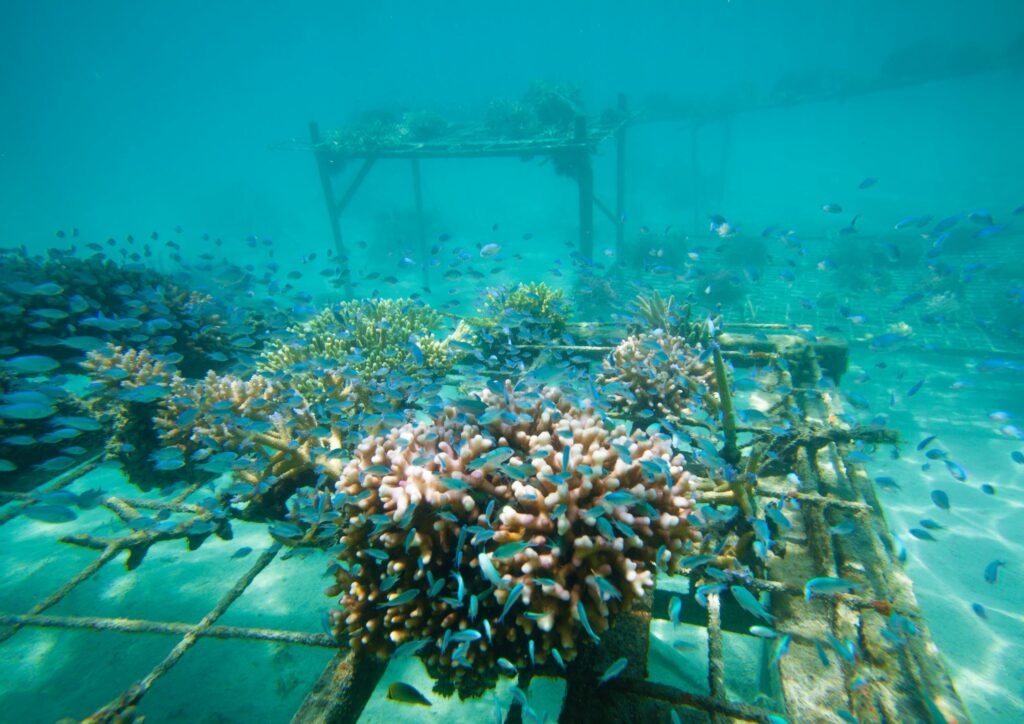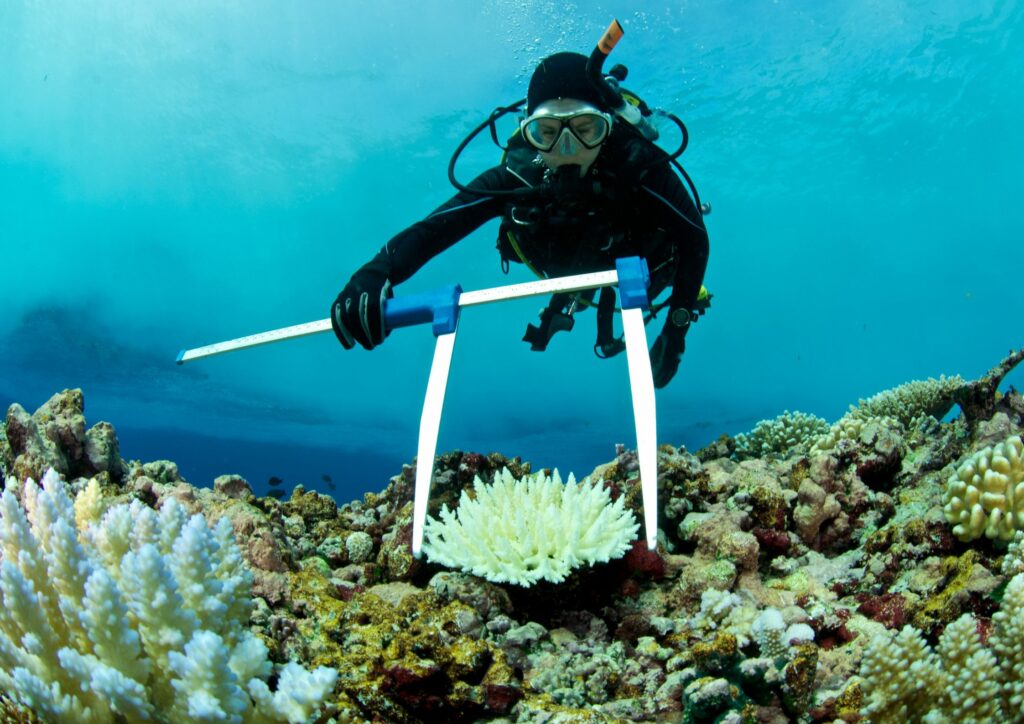Bali, an island celebrated for its stunning beaches and vibrant marine life, the coral conservation is facing a pressing environmental challenge: coral bleaching. This phenomenon, driven by climate change, threatens the very foundation of its underwater ecosystems. With corals supporting 25 percent of ocean life, sustaining our planet’s health hinges on their survival. In areas like Padang Bai, innovative coral plantation initiatives are underway, aimed at mitigating the impacts of bleaching and restoring the rich biodiversity that residents and visitors cherish. Join us as we explore the vital coral conservation efforts in Bali, uncovering the strategies and successes driving this remarkable environmental recovery.
Understanding Coral Bleaching: Causes and Consequences
Coral bleaching is a phenomenon that occurs when corals expel the algae living in their tissues, leading to a loss of color and vital nutrients. This distress is primarily caused by climate change, as rising sea temperatures trigger stress in coral ecosystems. When water gets too warm, corals become vulnerable, reducing their ability to support marine life.

Alarmingly, corals support about 25 percent of ocean life, making their degradation a critical issue for biodiversity. In Bali, specifically in areas like Padang Bai, efforts to combat coral bleaching and initiate coral plantation are taking place to restore these vital underwater ecosystems and ensure a thriving marine environment for future generations.
The Importance of Coral Reefs: Supporting 25 Percent of Ocean Life
Coral reefs are often referred to as the rainforests of the ocean, supporting a staggering 25 percent of all marine life. These vibrant underwater ecosystems provide food and shelter for countless species, from colorful fish to majestic sea turtles. However, the alarming rates of coral bleaching, primarily driven by climate change, pose significant threats to these crucial habitats.
In Bali, initiatives focused on coral conservation plantation, particularly in areas like Padang Bai, aim to restore damaged reefs and enhance biodiversity. Protecting and revitalizing coral ecosystems is essential not only for marine health but also for the livelihoods of local communities dependent on fishing and tourism.
Coral Plantation Initiatives in Padang Bai: A Local Success Story
In Padang Bai, a small fishing village in Bali, local initiatives focused on coral plantation have emerged as a beacon of hope for the underwater ecosystem. These efforts aim to combat coral bleaching, which has dramatically affected marine biodiversity, leading to the decline of coral reefs that support about 25 percent of ocean life.
Community-driven coral plantation projects not only restore damaged reefs but also enhance local tourism and provide sustainable livelihoods for the fishermen. By involving local residents in conservation efforts, Padang Bai is creating a model of how community engagement can lead to the revival of marine ecosystems threatened by climate change and pollution.
The Impact of Climate Change on Coral Ecosystems
Climate change poses a significant threat to coral ecosystems, leading to widespread coral bleaching and detrimental impacts on marine biodiversity. Rising ocean temperatures disrupt the delicate symbiosis between corals and their algae, causing corals to expel these essential organisms, leading to mass bleaching events. This phenomenon not only affects the corals themselves but also threatens the diverse underwater ecosystem that relies on corals, which support approximately 25 percent of ocean life.
In Bali, initiatives like coral conservation plantation in Padang Bai are critical for restoring these vital habitats and combating the adverse effects of climate change. Effective coral conservation efforts are essential to revitalizing damaged reefs, ensuring the survival of countless marine species, and maintaining the balance of marine ecosystems. By addressing the root causes of climate change and actively engaging in coral plantation projects, local communities and organizations can play a pivotal role in restoring the health of Bali’s underwater paradise for future generations.
Restoring the Underwater Ecosystem: Techniques and Innovations
Restoring the underwater ecosystem in Bali involves a range of innovative techniques aimed at combating coral bleaching and enhancing coral resilience. One significant approach is the establishment of coral plantations in Padang Bai, where strategically grown corals are nurtured to help rebuild damaged reefs. New technologies, such as coral gardening and underwater nurseries, allow for the planting of resilient coral species that can withstand climate change impacts. These coral conservation efforts are vital, as corals support 25 percent of ocean life, providing habitats for numerous marine species. By leveraging modern techniques, conservationists are working to revive these critical ecosystems, ensuring their survival for future generations.
Community Engagement in Coral Conservation Efforts
Community engagement plays a vital role in coral conservation efforts in Bali, particularly in areas like Padang Bai, where coral plantation initiatives are underway. Local communities are increasingly recognizing the importance of preserving their underwater ecosystems, which support 25 percent of ocean life. By actively involving residents in coral planting programs, they foster a sense of ownership and pride, ensuring sustainable practices. Educational workshops and outreach programs highlight the impacts of climate change, including coral bleaching, motivating locals to participate in protective measures. This collaborative approach not only enhances coral health but also strengthens the community’s ties to their marine environment.
Future Prospects for Coral Restoration in Bali
The future prospects for coral restoration in Bali are promising, as local conservation efforts gain momentum. With initiatives like coral plantation in Padang Bai, community involvement is notable in safeguarding these vital ecosystems. Restoration projects not only focus on replanting corals but also emphasize awareness about coral bleaching and the impacts of climate change. As corals support 25 percent of ocean life, their survival is crucial for marine biodiversity. Collaborative efforts between local communities, NGOs, and government agencies are essential in ensuring these initiatives are sustainable and effective. Continued education and research will further enhance the scope of coral conservation, fostering a healthier underwater ecosystem for generations to come.
Protecting Our Coral Reefs for Future Generations
As we have explored throughout this blog, the vitality of coral reefs is paramount not only to our underwater ecosystems but also to the overall health of our planet. Coral bleaching and climate change have dire effects on these beautiful underwater wonders, but efforts like coral plantation in Padang Bai represent a beacon of hope. By engaging in active coral conservation and supporting local initiatives, we can collectively nurture these ecosystems that support 25 percent of ocean life, ensuring they thrive for generations to come.
It is crucial for each of us to recognize the role we play in combating the ongoing threats to our corals and to actively participate in initiatives that foster their resilience while exploring Bali diving. Whether through eco-tourism, educational outreach, or direct involvement in conservation projects, together, we can pave the way for a brighter future for coral reefs in Bali and beyond. Let us cherish and protect these underwater treasures for not only their beauty but for the myriad of life they support.

I’m impressed by the efforts to combat coral bleaching in Bali. It’s essential to preserve these underwater ecosystems, not only for marine life but also for local communities dependent on fishing and tourism.
Thank you for your kind words about our coral conservation efforts in Bali! We’re indeed committed to preserving these vital ecosystems, not only for the marine life that depends on them but also for the local communities that rely on fishing and tourism. It’s a collective effort, and we appreciate your support. If you have any further questions or would like to get involved in our initiatives, please don’t hesitate to reach out to us at Tel: +65 6734 9373 or Email: [email protected].
I’m glad to see initiatives like coral plantation in Padang Bai making a difference. Community engagement is crucial in preserving our oceans’ health, and I hope more people will get involved in these efforts.
Thank you for sharing your thoughts, Rizal! We couldn’t agree more – community engagement is vital in coral conservation efforts. It’s heartwarming to see initiatives like the coral plantation in Padang Bai making a positive impact. We’re excited to see more people join hands with local communities to protect our oceans’ health. At Gill Divers, we believe that by working together, we can make a difference and ensure the survival of these incredible underwater ecosystems.
I’m worried about the impact of climate change on coral reefs. It’s heartbreaking to see these beautiful ecosystems decline. I hope governments and organizations will continue to support conservation efforts like coral plantation in Padang Bai.
We understand and share your concern about the impact of climate change on coral reefs, Ling Low. It’s indeed heartbreaking to see these ecosystems decline. At Gill Divers, we are committed to supporting conservation efforts like coral plantation in Padang Bai. Our objective is not only that our divers have a great time with us but also that they will adopt attitudes of better respect and appreciation of the ocean and its life. We believe that community engagement plays a vital role in coral conservation efforts, and initiatives like coral plantation in Padang Bai are crucial for restoring these vital habitats. If you’re interested in learning more about our coral conservation efforts or would like to get involved, please don’t hesitate to reach out to us at Tel: +65 6734 9373, Email: [email protected]. We look forward to hearing from you.